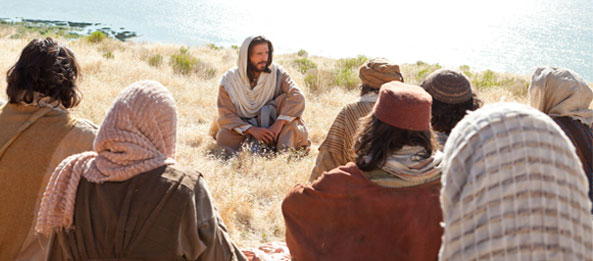Facing Your Gethsemane
Mark 14:32-42
At the time of writing this article many Christians have been beheaded for their faith in Northern Iraq and there is a fear that it will continue. What do we say to people who are about to die for their faith? Do we tell them that God promises them long life? Or that ‘no weapon formed against them shall prosper’? We can’t! It’s not even what we see modelled in scripture; eleven of the twelve apostles died for their faith. Can we send them a book on how God wants believers to live a happy, fulfilled and prosperous life? Of course not, how shallow our teachings have become! What these people need is a mentor who has walked a martyr’s path, someone who has been through it and has come out the other side. And of course there is no one better than our Lord Jesus himself.
Today I would like to focus on how Jesus wrestled with the proposition of death in the Garden of Gethsemane, and how he found the strength to remain faithful to the Fathers call. I am fully aware that most people reading this will not be called on to die for our faith, but all of us get to face Gethsemane to some degree because all of us face trials and temptations to some degree. And Gethsemane teaches us what to do when temptation is so strong that you can’t even think straight. You may be tempted to deny your Lord so you don’t die, or be tempted to run off with someone’s partner. Sometimes temptation is extremely dark and at other times it is quite shiny.
For Jesus Gethsemane was extremely dark. He knew he could either save himself or face a torturous death. He said “My soul is overwhelmed.” That means that the very core of his being was inundated with anguish. And so it should have been. Again and again martyrs through the history of the church have had to face the numbing thought of pain and death. And it is as Jesus anticipates the cruelness of the flogging and the nails that he is able to admit that “The spirit is willing, but the flesh is weak.”
But, here’s the important bit. Jesus knew what to do when his mind and emotions were in a spin. He goes to the one place he always found peace, clarity and strength. Jesus goes to the Father and cries ‘Abba.’ That’s Hebrew for ‘Daddy.’ Jews of his day did not call God ‘Father,’ let alone ‘Daddy.’ Jesus is different, he is intimate and tender. And he says “Daddy, everything is possible for you. Take this cup from me. Yet not what I will, but what you will.”
The cup is the suffering that is his portion. It’s like a cup before him on the table. He could refuse to drink it. His flesh would certainly prefer that, but his spirit is seeing a bigger picture – and there is a war going on between the two. But notice what his over-riding choice is: “not what I will, but what you will.” His choice is not “No weapon that is formed against me shall prosper.” How that verse has been misused again and again!
Now, we see that Jesus is not alone in the garden. He takes his closest disciples – Peter, James and John. He needs friends to keep watch for movement among the trees. He knows the enemy is close. He also needs friends that can relate to his weakness and seek strength with him; a team can handle more pressure than one person can on his own. But look what happens; they fall asleep! How can they do that? Did they understand the seriousness of this? It seems not. It seems that Jesus was the only one who was aware of how bad the situation was. But the message here is clear – Jesus found Peter sleeping three times, and Peter denied knowing Jesus three times. The implication is obvious that it seems to shout at us! It tells us that connection with the Father is vital when we need to anchor our resolve. It is in the place of prayer that our hearts are moulded and reset so we respond right when we are squeezed.
Luke 22:43 says ‘An angel from heaven appeared to him (Jesus) and strengthened him.’ How did the angel strengthen him? Was it emotional or physical? Did he touch Jesus or speak an encouraging word to him? Scripture doesn’t say. It also doesn’t tell us if Jesus heard the Father speak directly. He heard the Father so often you would think it would happen again at a time like this. What we do know is that Jesus’ demeanour suddenly changed. He said “Enough! The hour has come… Rise! Let us go!” This is no longer a man that is feeling overwhelmed but a man that is full of determination. Isaiah had insight into Jesus’ determination when he spoke for the Messiah saying “I set my face like flint and I know I will not be put to shame” (Is 50:7).
The writer to the Hebrews suggests something interesting about Jesus’ strength to endure. He says “Let us fix our eyes on Jesus … who for the joy set before him endured the cross” (Heb 12:2). What was the ‘joy set before’ Jesus that helped him endure? Did Jesus have a vision of what the cross would achieve? Did the angel show him souls rejoicing in heaven? We don’t know. But many who have given their lives for some great cause have had a vision or ultimate goal that was strong enough to carry them through the fear and pain. A martyr has to believe that the cause is worth dying for, that their death will make a powerful enough statement to change other people for the better. This is also true if the temptation you are facing is of the shiny, attractive variety. If you see how much benefit will result from you resisting evil you will be more likely to remain obedient. Proverbs 19:18 says “Where there is no revelation (or vision), people cast off restraint.”
The word ‘Gethsemane’ means ‘Oil Press.’ It was located at the base of the Mount of Olives. An oil press extracts oil from olives using pressure. So is it mere coincidence that we see the awesome endurance of Jesus once he passed through the pressure of Gethsemane? I think not! And this brings us to a more general thought. Many people in scripture faced a personal Gethsemane, a time of great pressure. Job lost his family and health, Joseph languished in prison, Daniel faced the lion’s den, and Esther risked execution for her people. All these people refused to lose faith in God regardless of the outcome and it made them stronger. Job said “Though He (God) slay me, yet will I trust Him” (Job 13:15).
So are you under pressure? What is your Gethsemane? Will you give in to the pressure or will you be formed by it? Every trial and temptation is an opportunity for promotion. You could emerge from your trial with a story of victory that will strengthen others. And if your trial involves giving your life for Christ it will never be forgotten. It will speak loudly for all eternity.
Jesus shows us where to get the strength to walk the road of martyrdom. He was there. He went to the Father, poured out his pain and found new resolve. Early believers saw martyrdom has the highest of callings. In fact some early believers had to be persuaded to not seek after martyrdom. So if you find yourself in that position don’t think something strange is happening to you, rather believe that you have found favour with God and walk the road as one that is chosen. You will be walking amongst a company that is truly great. The power of a life given for Christ is underestimated. Tertullian said “The blood of the martyrs is the seed of the Church.” In other words, the cold blooded killing of Christians only makes neutrals believe that Christians are good and their murderers are bad, and so more and more people willingly convert and fly the flag of Christ. And it is also true that where Christians die for their faith the church has greater purity, greater sincerity and thus a much greater power. If there is a ‘Glorious end time church,’ I am convinced it will be a heavily persecuted one. It will be one that has passed through the pressure of its own Gethsemane and emerged stronger on the other side.
It’s too easy to advise Christians whose lives are being threatened while we sit in a place of relative safety. So let’s finish with the words of the apostle Peter who was writing from Rome at a time when Christians were dying for their faith by the thousands. He says, “Dear friends, do not be surprised at the fiery ordeal that has come on you to test you, as though something strange were happening to you. But rejoice inasmuch as you participate in the sufferings of Christ, so that you may be overjoyed when his glory is revealed” (1 Peter 4:12-13). So be it.







